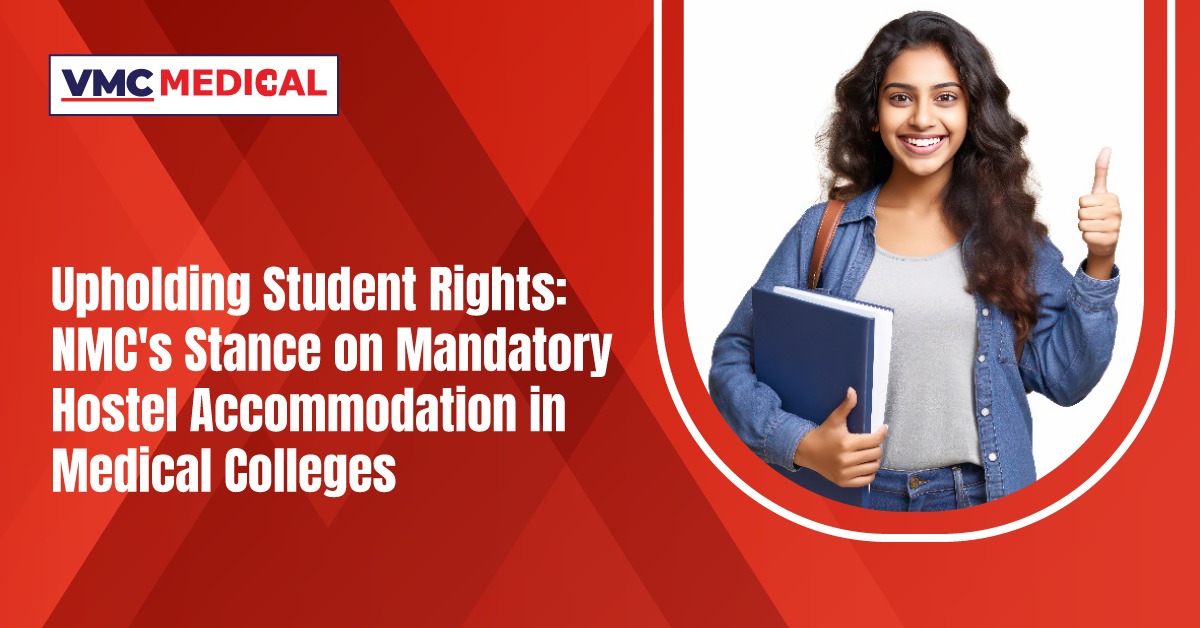Upholding Student Rights: NMC’s Stance on Mandatory Hostel Accommodation in Medical Colleges
 Posted On
Posted On
297 total views, 2 views today
In recent developments concerning the accommodation of postgraduate medical students, the National Medical Commission (NMC) has taken a firm stance against the compulsory residency in college-provided hostels. Despite previous warnings, numerous medical colleges have been reported for coercing students into residing in designated hostels, often accompanied by exorbitant charges. This practice blatantly violates Regulation 5.6 of the Post Graduate Medical Education Regulation (PGMER), 2023, which clearly states that while colleges must offer suitable residential accommodation, it is not mandatory for students to avail themselves of these facilities.
The NMC, as the apex regulatory body for medical education and practices in India, has issued an advisory reiterating the provisions of Regulation 5.6 and emphasizing the rights of postgraduate medical students. This advisory comes in the wake of persistent complaints from students regarding the undue pressure exerted by medical colleges to compel them into hostel accommodation. Such actions not only contravene established regulations but also undermine the autonomy of students in choosing their living arrangements during their academic pursuits.
It is imperative to recognize that the NMC’s directives are not arbitrary but rooted in the framework of regulations aimed at ensuring the welfare and rights of medical students. The PGMER, 2023, supersedes previous regulations and explicitly states that the residency of students in college-provided hostels is voluntary. This departure from earlier mandates, such as those outlined in the PGMER, 2000, reflects a progressive approach towards student accommodation, acknowledging the diverse needs and preferences of individuals pursuing postgraduate medical education.
Furthermore, the NMC’s response to these grievances underscores its commitment to upholding the integrity of medical education. By directing all medical colleges and institutes to adhere strictly to Regulation 5.6, the NMC is not only safeguarding the rights of students but also ensuring accountability within the medical education sector. Non-compliance with these regulations may result in punitive actions against erring colleges, including monetary penalties, reduction of seats, or suspension of admissions, as stipulated in Regulations 9.1 and 9.2 of the PGMER, 2023.
The significance of this advisory extends beyond the issue of hostel accommodation to encompass broader themes of student autonomy, institutional accountability, and regulatory oversight in medical education. It underscores the pivotal role of regulatory bodies like the NMC in safeguarding the interests of students and fostering a conducive learning environment free from undue coercion or exploitation.
In light of these developments, it is incumbent upon medical colleges and institutions to reassess their policies and practices regarding student accommodation. Rather than imposing mandatory hostel stays, colleges should prioritize providing diverse accommodation options that cater to the varying needs and preferences of students. This approach not only aligns with regulatory mandates but also promotes inclusivity and respect for student autonomy.
Moreover, the NMC’s proactive intervention serves as a reminder to all stakeholders in the medical education ecosystem of the importance of compliance with regulatory frameworks. Upholding the principles of fairness, transparency, and student-centricity should be paramount in shaping institutional policies and practices.
Moving forward, concerted efforts must be made to foster a culture of mutual respect and collaboration between medical colleges and students. Dialogue and engagement between stakeholders can facilitate the identification of systemic issues and the formulation of effective solutions that uphold the rights and well-being of students.
Closing Thoughts
In conclusion, the NMC’s advisory regarding mandatory hostel accommodation for postgraduate medical students reflects a commitment to ensuring student rights and upholding regulatory standards in medical education. By reiterating the voluntary nature of hostel residency and warning against non-compliance, the NMC sends a clear message regarding the importance of respecting student autonomy and fostering a supportive learning environment. It is incumbent upon all stakeholders to heed these directives and work towards creating an inclusive and student-centric academic environment in medical colleges across the country.




